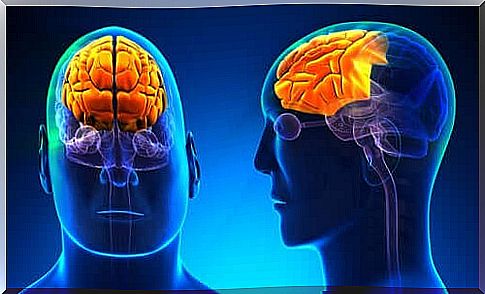The Neurobiology Behind Alcoholism

Just as there is a neuroanatomical and neurofunctional framework for explaining human behavior, we also have the neurobiology behind alcoholism. In this article we will explain what happens in the brain of a person with alcohol addiction.
Alcohol is the most widely used legal drug. It has a great social and economic burden in society and is capable of causing both physical and mental dependence. According to the World Health Organization (WHO), 140 million people in the world are affected by alcoholism, and it is the fifth most common cause of premature death.
There are many diseases and conditions associated with alcohol intake, from tuberculosis to HIV and infections. So, what happens in the brain after drinking alcohol and, more specifically, when one is struggling with addiction ? This is where the neurobiology behind alcoholism comes in.
The neurobiology behind alcoholism explained
The cause and development of alcoholism involves a complex interplay between biological, psychological, social and environmental factors.
The most reliable indicators that a person may become addicted are genetic or hereditary factors. The innate predisposition an individual has to suffer from alcoholism is behind up to 60% of cases.

From a biochemical point of view, the risk of alcohol dependence is related to variations in genes that encode proteins that consist of two specific enzymes : alcohol dehydrogenase and aldehyde dehydrogenase.
However, in addition to the possible hereditary origin, researchers suggest other potential neurobiological causes, such as a reduction in the level of the MAO-A enzyme (Monoamine oxidase type A) that some people suffer from after experiencing traumatic events.
Of course, there are other possible explanations for the cause of more common types of behavioral alcoholism. These have to do with learning experiences and personality traits. The effects are the same, but at a different level than the neurobiological ones. At the same time , however , there is a direct connection.
Hormones and neurotransmitters in the neurobiology behind alcoholism
Researchers have shown that alcohol, either directly or indirectly, can interact with a wide range of neurotransmitters in the nervous system. This interaction occurs due to the lipo-soluble origin of ethyl alcohol (ethanol), which allows it to cross the blood-brain barrier and thus reach the brain.
The neurotransmitters and hormones susceptible to interaction with ethanol are as follows:
- GABA
- Glutamate
- Endogenous opioids
- Dopamine
- Adrenaline and noradrenaline
- Acetylcholine
- Serotonin
- Cannabinoids
- Corticoliberin ( corticotropin releasing factor , CRH)
- Neuropeptide Y

Alcohol dependence is a deficiency in the physiological regulatory capacity of our endogenous motivational and reward systems. Several brain structures are responsible for these systems that influence human behavior; systems such as the limbic system, amygdala, hippocampus, nucleus caudatus , nucleus accumbens and forehead lobe.
A dysfunction in the mentioned systems may be related to alcohol dependence, intoxication caused by alcohol, or withdrawal symptoms.
The effects of alcoholism
Alcohol consumption causes an inhibitory effect and has a depressant effect on the central nervous system. The former is characterized by a blockage in and change in the structure of the brain, as well as by processes related to thinking, reflection or ethical values, among others. In addition, it promotes impulsivity and uncontrolled display of certain emotions.
In this way, some very relevant cognitive functions are more or less permanently affected. These include the executive functions (cognitive processes related to behavior) in the frontal lobe, memory problems, visuospatial difficulties and problems with motor and oculomotor control.
The inhibitory effect
The inhibitory effect that alcohol causes, allows the person to behave in a way they would not do if they were sober. Alcohol can cause a temporary feeling of freedom, empathy and increased emotions.
In general, the development of alcoholism can be explained by the effects of positive reinforcement that alcohol consumption causes in the brain. The intake of this substance activates the brain’s reward system and generates pleasant sensations that make the brain want to consume more.
There are many resources to support and help alcoholics. Consulting your GP is the best first step in starting the detoxification process.
As you can see, the neurobiology behind alcoholism explains how and when, in terms of the behavior behind alcohol abuse. “Why” is much harder to explain. However, we can hope that the many existing approaches can be of great help to those who suffer from this terrible addiction.









